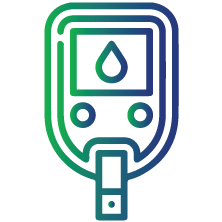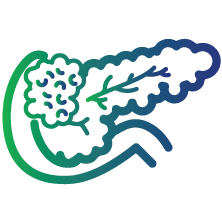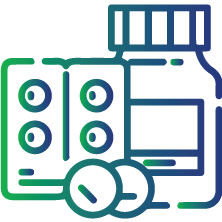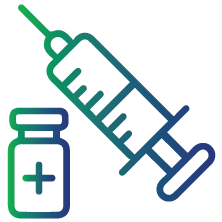
C-peptide post-prandial (PP)
C-peptide post-prandial (PP)
C-peptide is a by-product that pancreas produces while making insulin. In general, the pancreas produces equal amounts of C-peptide and insulin. Insulin is a hormone that regulates blood sugar (glucose) levels in the body, facilitating glucose absorption, and utilization by cells in the muscles, liver, and fat.
The C-peptide pp test detects the presence of C-peptide in the blood. Measuring the C-peptide is an accurate way of determining how much insulin is produced in the body by the pancreas. C-peptide does not affect glucose levels in the body, but it remains for a longer duration in blood than insulin. As a result, it aids in accurately determining how much insulin is produced.
What is C-peptide pp test used for?
A C-peptide pp test is required in the following conditions:
· To classify the type of diabetes you have (type 1 or type 2)
· To manage and monitor diabetes treatment
· To determine if enough insulin is being produced in the body
· To detect the cause of low blood sugar (hypoglycaemia)
· To distinguish between the naturally produced insulin and one that is supplied from outside (injection form)
· To check pancreatic cancer status (Rarely)
Who should get tested?
This test is indicated if you

Have been diagnosed with low blood sugar

Have diabetes

Are diagnosed with pancreatic tumour

Need a change in the prescribed diabetes medication

Need to start taking insulin
Test preparation
For accurate c-peptide post-prandial testing, it is essential to consume a standard meal before the test. This helps assess how your body processes glucose after eating. Follow your healthcare provider's instructions on the type and timing of the meal before the test
Interpretation of the Test Results
Normal range: 1–3 nmol/l (Nano moles per liter)
Deviations from the normal levels indicate:
The levels of C-peptide in the blood may be high or low based on the amount of insulin that your body produces.
· A high C-peptide level usually indicates a condition that causes high insulin levels in the body, such as type 2 diabetes, Cushing's syndrome, insulinoma - a pancreatic tumour, kidney failure, and low potassium levels in the blood.
· A low C-peptide level may indicate conditions that cause low insulin levels in the body, such as type 1 diabetes and, in some cases, type 2 diabetes, a severe infection, Addison disease, liver disease, or excessive insulin intake (causes pancreas to stop making its insulin).
FAQs
Are there any risks associated with C-peptide post-prandial testing?
There are no potential risks associated with C-peptide post-prandial testing. This simple blood test only carries minimal risks, such as a slight sting or bruise at the needle insertion site. Generally, any discomfort experienced resolves within a few minutes to a couple of hours
My doctor is thinking of changing my diabetes medications. Do I need to undergo C-peptide post-prandial testing?
C-peptide post-prandial test is advised for several reasons. Among these are managing and monitoring the diabetes treatment plan. If your doctor intends to change your diabetes treatment plan, you may be advised to undergo a C-peptide test
What is the turnaround time (TAT) for C-peptide post-prandial test?
The results of a C-peptide test are typically available within 1 to 5 days after the sample is collected. This may vary depending on the diagnostic clinic
What might affect my C-peptide post-prandial test results?
Factors that can influence C-peptide test results include recent meals, insulin therapy, kidney function, and certain medications. It is essential to discuss these variables with your healthcare provider before undergoing the test
I have diabetes but my C-peptide post-prandial results are normal. What does it indicate?
Individuals with type 2 diabetes may exhibit normal C-peptide results after undergoing the test. This can be attributed to the use of diabetes medication or the presence of a non-cancerous growth in the pancreas (insulinoma). It is advised to consult your healthcare provider to gain a better understanding of your particular condition

